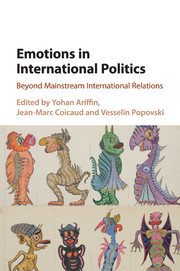Description
Emotions in International Politics
Beyond Mainstream International Relations
Coordinators: Ariffin Yohan, Coicaud Jean-Marc, Popovski Vesselin
This book investigates collective emotions in international politics, with examples from 9/11 and World War II to the Rwandan genocide.
Language: English
Subject for Emotions in International Politics:
Emotions in International Politics
Publication date: 05-2017
Support: Print on demand
Publication date: 05-2017
Support: Print on demand
Emotions in International Politics
Publication date: 01-2016
434 p. · 16x23.6 cm · Hardback
Publication date: 01-2016
434 p. · 16x23.6 cm · Hardback
Description
/li>Contents
/li>Biography
/li>
In recent years, social scientists have increasingly recognized the interconnectedness of thought on emotions. Nowhere is the role of passions more evident than international politics, where pride, anger, guilt, fear, empathy, and other feelings are routinely on display. But in the absence of an overarching theory of emotions, how can we understand their role at the international level? Emotions in International Politics fills the need for theoretical tools in the new and rapidly growing subfield of international relations. Eminent scholars from a range of disciplines consider how emotions can be investigated from an international perspective involving collective players, drawing evidence from such emotionally fraught events as the Rwandan genocide, World War II, the 9/11 attacks, and the Iranian nuclear standoff. The path-breaking research collected in Emotions in International Politics will be a valuable theoretical guide to understanding conflict and cooperation in international relations.
Preface Richard Ned Lebow; Introduction Yohan Ariffin; Part I. Towards an Interdisciplinary Analysis of Emotions in International Politics: 1. The question of emotions and passions in mainstream international relations, and beyond Jean-Marc Coicaud; 2. Emotion and change: where history comes in Peter N. Stearns; 3. The sociology of face-to-face emotions James M. Jasper; 4. From intersubjectivity to international relations: the teachings of the 'emotive turn' of cognitive science? Jean-Michel Roy; 5. Emotions of uncertainty, competition, and cooperation in the international financial sector Jocelyn Pixley; 6. Exploring the nexus of emotions/passions, values, and rights in international affairs Jean-Marc Coicaud; 7. Psychoanalysis and the study of emotions in international politics Pierre de Senarclens; 8. Emotions and international law Vesselin Popovski; Part II. Emotions in Foreign Policy Decision Making and in War and Peace: 9. Assessing the role of emotives in international relations Yohan Ariffin; 10. The role of emotions in foreign policy decision making: embarrassment from the Bay of Pigs Assia Alexieva; 11. Shadow of guilt: US Rwandese relations after 1994 genocide Ainius Lasas; 12. Emotions and passions of death and the making of World War II: the cases of Germany and Japan Jean-Marc Coicaud; 13. From group identity to ethnic violence Pierre de Senarclens; 14. Exceptionalism, counterterrorism, and the emotional politics of human rights Andrew Ross; 15. The dialectic of rage: how anger, fear, pride, and some other passion combine, interact, and fight each other in the post-Cold War world Pierre Hassner; 16. Transforming conflict: trust, empathy, and dialogue Naomi Head; 17. The role of emotives in the international management of plant genetic resources Yohan Ariffin; Conclusion Jean-Marc Coicaud.
Yohan Ariffin is senior lecturer at the Institut d'etudes politiques, historiques et internationales, Université de Lausanne, Switzerland. His work addresses the role of normative and affective ideas in international relations. He has held research fellowships at the London School of Economics and Political Science, the Victoria and Albert Museum, and the Institut d'études politiques, Paris.
Jean-Marc Coicaud is Professor of Law and Global Affairs and Director of the Division of Global Affairs at Rutgers University, New Jersey. In addition to serving as a Global Ethics Fellow with the Carnegie Council for Ethics in International Affairs, he has published widely in the fields of political theory, comparative politics, international relations, and international law.
Vesselin Popovski is Vice Dean of the Law School and Executive Director of the Centre for UN Studies at Jindal Global University, India. He is the author of numerous books and articles on human rights and public international law and has participated in major international initiatives including the International Commission on Intervention and State Sovereignty, and the Princeton Project on Universal Jurisdiction.
Jean-Marc Coicaud is Professor of Law and Global Affairs and Director of the Division of Global Affairs at Rutgers University, New Jersey. In addition to serving as a Global Ethics Fellow with the Carnegie Council for Ethics in International Affairs, he has published widely in the fields of political theory, comparative politics, international relations, and international law.
Vesselin Popovski is Vice Dean of the Law School and Executive Director of the Centre for UN Studies at Jindal Global University, India. He is the author of numerous books and articles on human rights and public international law and has participated in major international initiatives including the International Commission on Intervention and State Sovereignty, and the Princeton Project on Universal Jurisdiction.
© 2024 LAVOISIER S.A.S.
These books may interest you

Emotions, Politics and War 58.78 €



